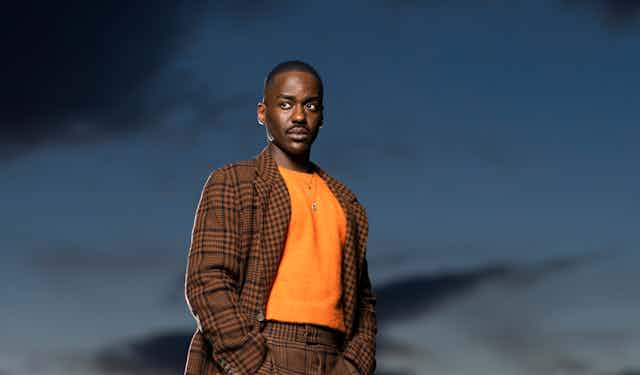Fans across the globe have been celebrating 60 years of Doctor Who – the world’s longest-running science fiction series. It may at times seem silly and childish, but people’s ideas of how the world works, could work and should work are informed and shaped by popular culture – and Doctor Who still influences this.
The time lord has waged his (and for a few years her) fight for justice from the moment of the Big Bang that created the universe to the heat death that ended it.
As children, all three of us cowered behind the sofa as monsters and mad scientists were foiled by the Doctor. We grew up to be a historian, an expert in science policy and a researcher in sustainability who have come to together, as fans of the show, to research what it tells us about popular ideas of climate and energy justice. These issues are now critical in the real world, to find ways to combat climate disaster fairly.
Looking in detail at five episodes across the show’s 60 years, we found that it doesn’t really advocate for climate or energy justice. Instead, the writers offer the Doctor – and those he inspires to fight oppression – a metaphorical big red button that says: “Press here to reset your society.”
The series continually fails to back ideas that are at the core of energy justice critique: that people should be able to advance their own interests through political power and legal process.
Rather, once the Doctor arrives, anyone who is oppressed can just sit back and relax, waiting for the Doctor to fix everything.
Doctor Who and the environment
The five episodes we looked at include stories about “savages” on an unnamed planet fighting for fair access to resources, tax inspectors on Pluto, mad scientists drilling the Earth’s core, miners’ strikes on an alien planet, and attempts to halt the industrial revolution in the 19th century.
In these stories, like many others, the Doctor arrives, encounters injustice, then almost magically overcomes evil and resets society.
What’s missing is the involvement of the oppressed people. Whether they are “savages”, oppressed miners, workers in outer-space worlds or 19th-century labourers, the Doctor solves all their problems for them with a quip and a wave of the sonic screwdriver. He fights oppression but only on behalf of, or in a superficial way with, the oppressed.
In the 1966 episode The Savages, for example, an unjust society is toppled in a matter of minutes. In The Monster of Peladon (1974), exploited miners are easily reconciled to their overlords and masters because the queen, guided by the Doctor, asks everyone to get along. And in The Mark of the Rani (1985), the workers’ fear that new technology will take away their jobs is explained away as just an alien plot.
Sympathy for exploited people is expressed in a way that does not treat them as equals. The Doctor fights their battles for them, while they are depicted as needing fair access to resources but unwilling or unable to lift a finger to get them. This is hardly an empowering or inspiring narrative.
What can we learn from science fiction?
As our planet warms, more than ever we need to find ways to overcome persistent and systemic climate injustice. That includes understanding there are no saviours who will do it all for us – we have to tackle these things ourselves. Thinking about the messages that popular culture sends is one way to understand action or inaction on climate change.
Sixty years of Doctor Who is a special anniversary. Over the decades, the programme has presented incredible adventures and thought-provoking ideas.
If the current showrunner, Russell T Davies, were to remake Monster of Peladon, we would hope to see the miners, with help from the Doctor, saving themselves. No reset buttons, just the hard grind of organising, resisting and winning social and environmental justice.
As we watch and celebrate Doctor Who at 60, it can help us understand the reality that there will never be an external saviour arriving in a Tardis. As climate justice gets ever more important, we can learn from Doctor Who that it’s time we started to fight our own battles.

Looking for something good? Cut through the noise with a carefully curated selection of the latest releases, live events and exhibitions, straight to your inbox every fortnight, on Fridays. Sign up here.

